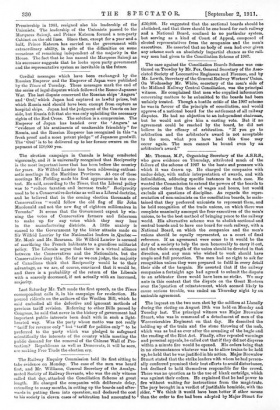Mr. Thomas, M.P., Organizing Secretary of the A.S.R.S., who gave
evidence on Thursday, attributed much of the failure of the scheme of 1907 to the haste and pressure with which it was drawn up. He charged the companies with undue delay, with unfair interpretation of awards, and with intimidation, adducing specific instances in each case. He wanted the Commission to extend the powers of the boards to questions other than those of wages and hours, but would exclude all questions of discipline. As regards the repre- sentation of non-unionists on the conciliation boards, he main- tained that they preferred unionists to represent them, and he held recognition of the trade unions, on which there was complete unanimity amongst the four executives of the men's unions, to be the best method of bringing peace to the railway world. His alternative scheme was to abolish sectional and central boards and to have one board for each railway, with a National Board, on which the companies and the men's unions should be equally represented, as a court of final reference. If an agreement were come to it would be the duty of a society to help the men honourably to carry it out, and the whole strength of the union should be devoted in that direction, and any man who wished to work should have ample and full protection. The men had no right to ask for recognition unless they were prepared to fulfil in every detail their side of the bargain. He asserted that if the railway companies a fortnight ago bad agreed to submit the dispute to an arbitrator there would have been no strike. We may note in this context that the dispute on the Great Eastern over the 'question of reinstatement, which seemed likely to cause serious trouble, was ended on Thursday night by an amicable agreement.






































 Previous page
Previous page